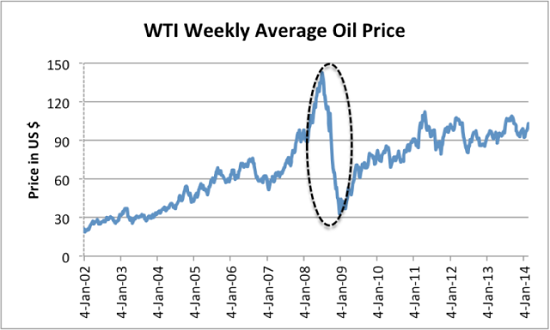Given the presumed 17% expansion of the global economy since 2009, the tiny increases in production could not possibly flood the world in oil unless demand has cratered.
The term Black Swan shows up in all sorts of discussions, but what does it actually mean? Though the term has roots stretching back to the 16th century, today it refers to author Nassim Taleb’s meaning as defined in his books, Fooled by Randomness: The Hidden Role of Chance in Life and in the Markets and The Black Swan: The Impact of the Highly Improbable:
“First, it is an outlier, as it lies outside the realm of regular expectations, because nothing in the past can convincingly point to its possibility. Second, it carries an extreme ‘impact’. Third, in spite of its outlier status, human nature makes us concoct explanations for its occurrence after the fact, making it explainable and predictable.”
Simply put, black swans are undirected and unpredicted. The Wikipedia entry lists three criteria based on Taleb’s work:
1. The event is a surprise (to the observer).
 The Black Swan: Second...
Best Price: $3.11
Buy New $10.37
(as of 01:40 UTC - Details)
The Black Swan: Second...
Best Price: $3.11
Buy New $10.37
(as of 01:40 UTC - Details)
2. The event has a major effect.
3. After the first recorded instance of the event, it is rationalized by hindsight, as if it could have been expected; that is, the relevant data were available but unaccounted for in risk mitigation programs.
It is my contention that the recent free-fall in the price of oil qualifies as a financial Black Swan. Let’s go through the criteria:
1. How many analysts/pundits predicted the 37% decline in the price of oil, from $105/barrel in July to $66/barrel at the end of November? Perhaps somebody predicted a 37% drop in oil in the span of five months, but if so, I haven’t run across their prediction.
For context, here is a chart of crude oil from 2010 to the present. Note that price has crashed through the support that held through the many crises of the past four years. The conclusion that this reflects a global decline in demand that characterizes recessions is undeniable.

I think we can fairly conclude that this free-fall in the price of oil qualifies as an outlieroutside the realm of regular expectations, unpredicted and unpredictable.
Why was it unpredictable? In the past, oil spikes tipped the global economy into recession. This is visible in this chart of oil since 2002; the 100+% spike in oil from $70+/barrel to $140+/barrel in a matter of months helped push the global economy into recession.
The mechanism is common-sense: every additional dollar that must be spent on energy is taken away from spending on other goods and services. As consumption tanks, over-extended borrowers and lenders implode, “risk-on” borrowing and speculation dry up and the economy slides into recession.

But the current global recession did not result from an oil spike. Indeed, oil prices have been trading in a narrow band for several years, as we can see in this chart from the Energy Information Agency (EIA) of the U.S. government.
 Real Dissent: A Libert...
Buy New $3.99
(as of 07:30 UTC - Details)
Real Dissent: A Libert...
Buy New $3.99
(as of 07:30 UTC - Details)
 Progressivism: A Prime...
Best Price: $8.99
Buy New $10.95
(as of 08:30 UTC - Details)
Progressivism: A Prime...
Best Price: $8.99
Buy New $10.95
(as of 08:30 UTC - Details)
 Fascism versus Capitalism
Buy New $4.75
(as of 08:05 UTC - Details)
Fascism versus Capitalism
Buy New $4.75
(as of 08:05 UTC - Details)
 Get a Job, Build a Rea...
Best Price: $7.99
Buy New $13.99
(as of 02:30 UTC - Details)
Get a Job, Build a Rea...
Best Price: $7.99
Buy New $13.99
(as of 02:30 UTC - Details)





